In today's fast-paced tech landscape, software developers, quality assurance analysts, and testers are expected to deliver flawless digital products at breakneck speeds. To keep up, outsourcing software testing services has become a strategic necessity rather than a luxury. This blog explores why modern teams depend on software testing outsourcing and how it enhances software quality assurance, efficiency, and scalability.
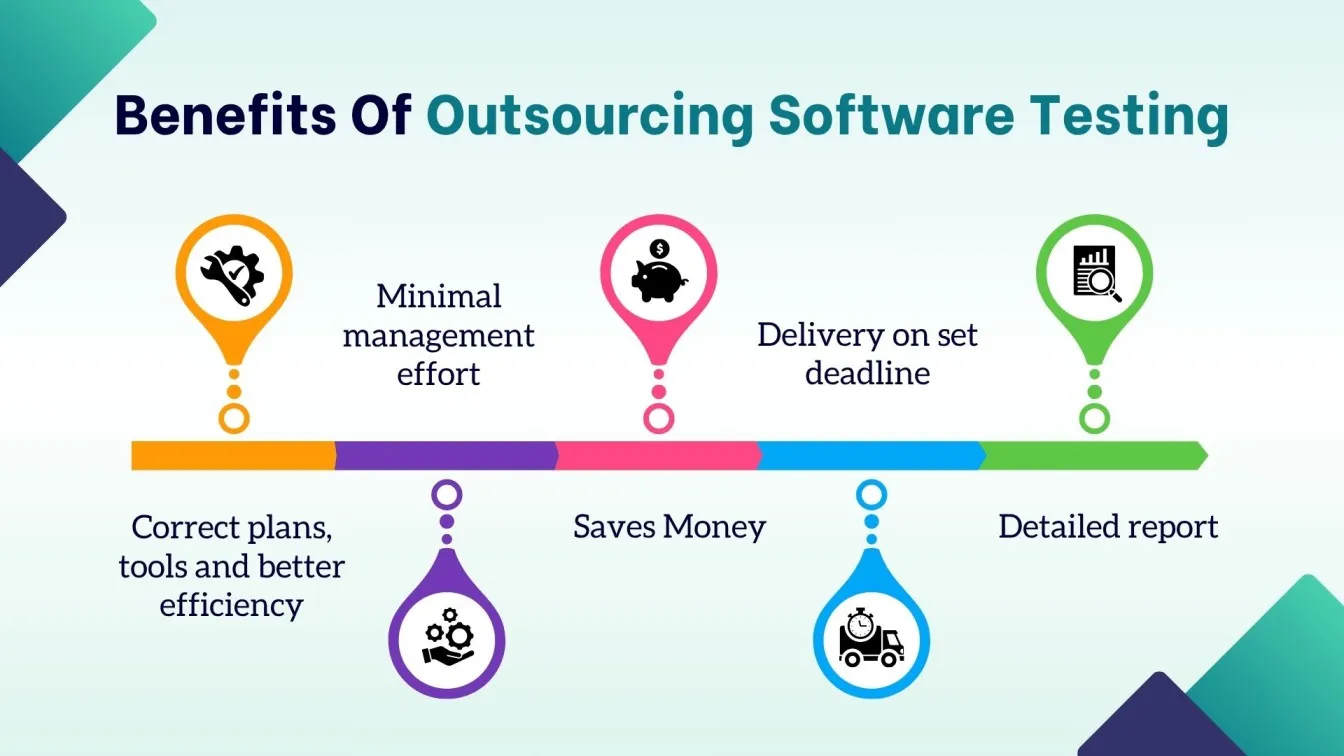
✨ What you can expect
📌 Why outsourcing software testing services is a strategic move beyond just cost-saving.
📌 How QA testers and QA engineers from outsourcing partners boost coverage and speed.
📌 The critical role of AI in software testing for smart automation and self-healing scripts.
📌 Benefits of combining manual QA testing with automated and regression testing.
📌 How industry tools like the JIRA software testing tool enhance collaboration and transparency.
📌 Why software quality assurance and performance testing are more scalable through outsourcing.
📌 Explore how QA automation services support continuous delivery and shorter release cycles.
The Rising Complexity of Modern Software Projects
As software becomes more integral to every industry, its development has grown increasingly intricate. Businesses are turning to software testing outsourcing companies to help manage these evolving complexities effectively.
Growing Demands on Software Developers and Testers
Today’s software developers, quality assurance analysts, and testers face increasing pressure to deliver high-performing, bug-free applications in shorter development cycles. Modern software projects are no longer simple.
This is where qa testing outsourcing becomes invaluable. By delegating the testing responsibilities to a team of dedicated QA professionals, organizations can free up internal resources to focus on building features, optimizing code, and accelerating product innovation.
Outsourced teams specialize in using the latest software testing services, such as automated software testing, AI in software testing, and software regression testing, security testing, functional testing service advancements, which help ensure comprehensive coverage and consistent quality across every release.
The Expanding Scope of the Software Testing Life Cycle
The modern software testing life cycle (STLC) is no longer limited to traditional testing methodologies, such as writing and executing test cases. It now spans a wide array of stages, including requirements analysis, test planning, test case design, test environment setup, test execution, defect tracking, regression testing, and post-deployment maintenance. Each of these phases demands specialized knowledge, coordination, and the use of advanced tools to ensure thorough and efficient software quality assurance.
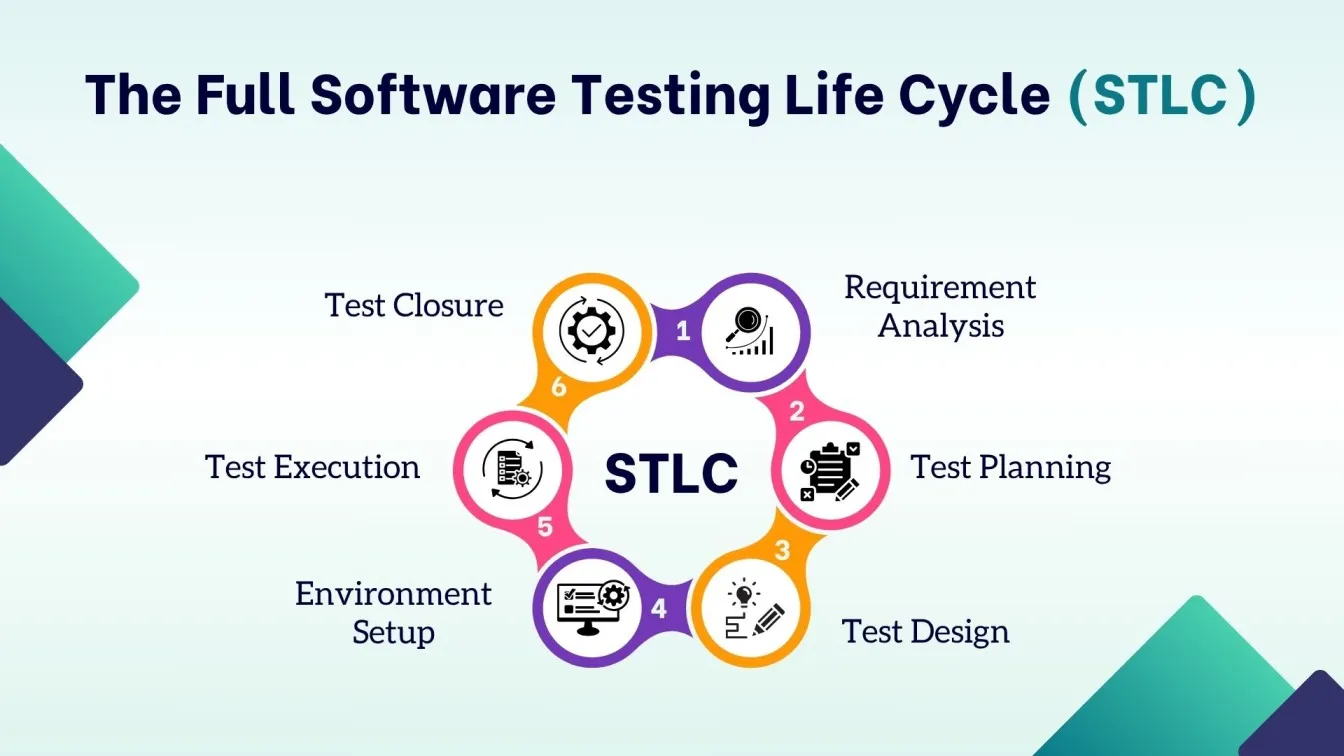
Managing this entire life cycle in-house often becomes overwhelming, especially for organizations with limited QA resources. Internal teams may lack access to enterprise-grade quality assurance management software, expert qa testers, or the latest test automation technologies. This is precisely why many businesses turn to software testing outsourcing to ensure every phase of the STLC is handled with precision and expertise.
Why Manual QA Testing Alone No Longer Suffices
Manual QA testing is still valuable, especially for exploratory and usability testing. However, as modern software grows more complex and development cycles become shorter, manual testing alone cannot keep up with the demand for speed, accuracy, and scalability.
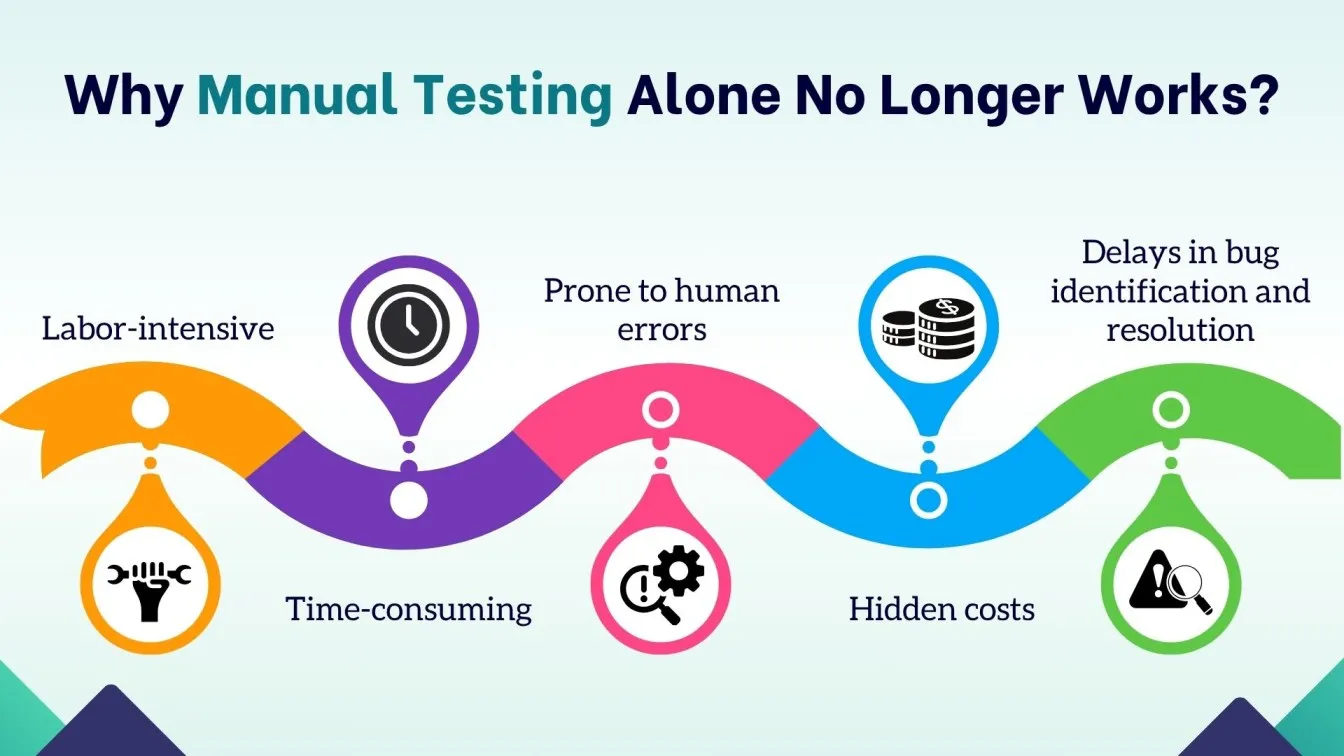
To meet these challenges, businesses now combine manual QA testing with automated software testing and AI in software testing. This hybrid approach improves test coverage, reduces human error, and accelerates the software testing life cycle.
Tools like the JIRA software testing tool and advanced quality assurance management software help streamline test case management and defect tracking.
Many organizations partner with software testing outsourcing companies to implement this efficient model. These vendors offer expert qa engineers, qa testers, and access to specialized software testing services, including qa automation, AI-enabled testing, and software regression testing.
By leveraging qa testing outsourcing and outsourcing software testing services, businesses ensure faster releases and stronger software quality assurance.
In-House vs. Outsourced Testing: What’s the Real Difference?
Balancing quality with speed is a constant challenge for in-house QA teams. Limited resources, competing priorities, and tight release cycles can make it difficult to maintain rigorous testing without slowing down development. In contrast, outsourcing software testing provides businesses with access to specialized expertise, scalable teams, and advanced testing tools, often at a lower cost.
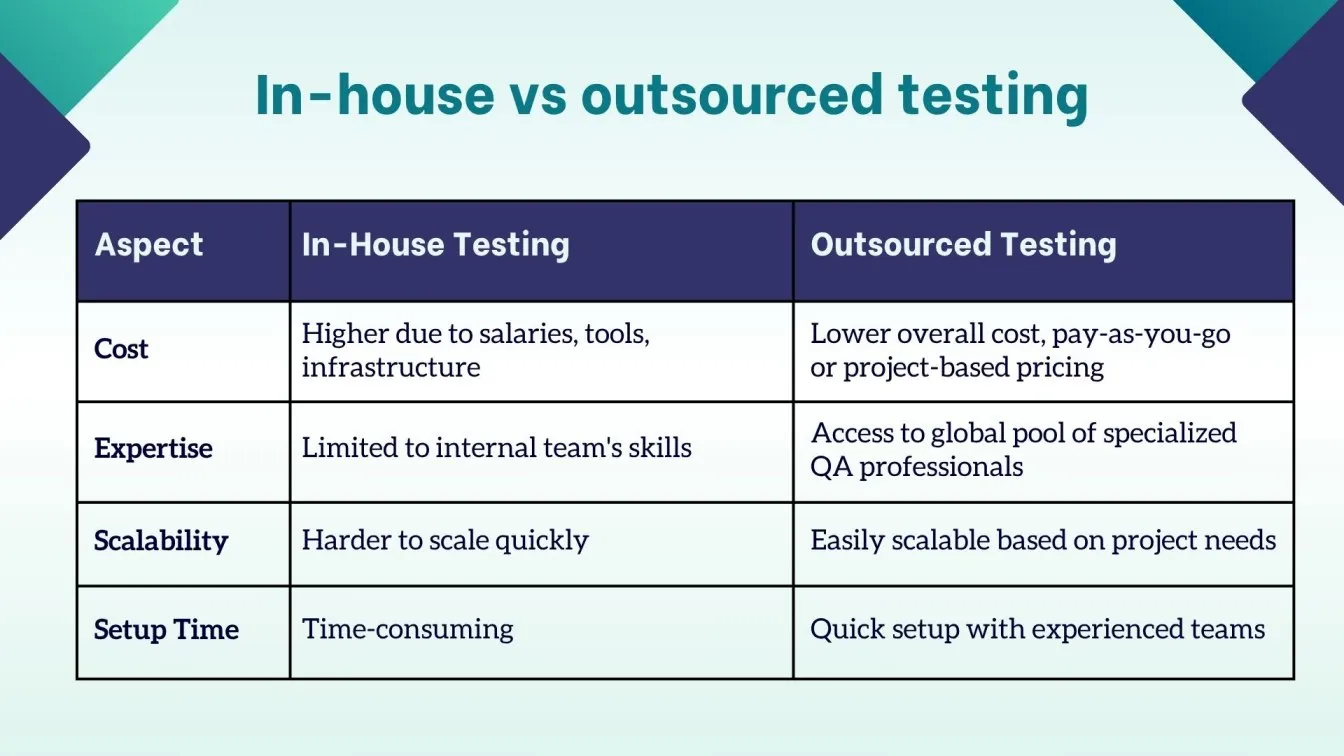
Resource Constraints Faced by Internal QA Teams
Internal QA teams often operate under intense pressure, dealing with limited time, a lack of advanced tools, and a shortage of skilled qa testers and qa engineers. As the scope of the software testing life cycle expands, it becomes harder for in-house teams to manage tasks like test planning, execution, software regression testing, and performance analysis without delays or quality compromises.
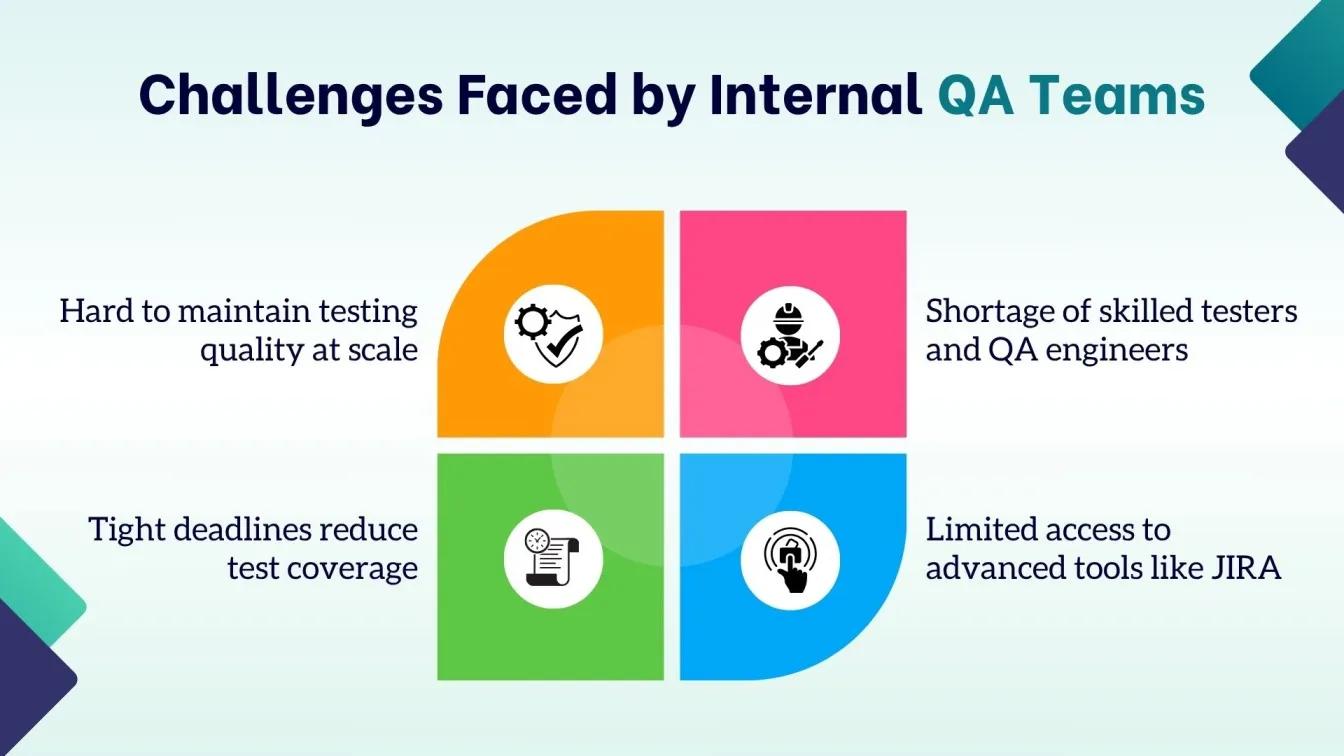
To address these challenges, companies turn to outsourcing software testing services. Partnering with software testing outsourcing companies provides immediate access to experienced professionals, scalable software testing services, and technologies tailored for speed and accuracy.
This qa testing outsourcing approach allows internal developers to focus on product delivery while outsourced teams ensure strong software quality assurance through expert-driven qa automation and continuous testing support.
Outsourcing Software Testing Services for Scalable Solutions
Scalability is one of the biggest advantages of outsourcing software testing services. Whether you're a startup launching an MVP or a large enterprise managing multiple releases, outsourced teams can quickly adjust to your project size and complexity.
By engaging with top software testing outsourcing companies, businesses gain access to comprehensive software testing services, including qa automation, AI in software testing, and network performance testing. This qa testing outsourcing model enables consistent software quality assurance while adapting seamlessly to changing project demands and delivery schedules.
Real-World Benefits from Software Testing Outsourcing Companies
Partnering with software testing outsourcing companies offers more than just cost savings; it provides access to specialized expertise, advanced technologies, and proven testing frameworks. These companies employ skilled qa engineers and qa testers who are experienced in handling complex applications across industries, ensuring reliable and scalable software testing services.
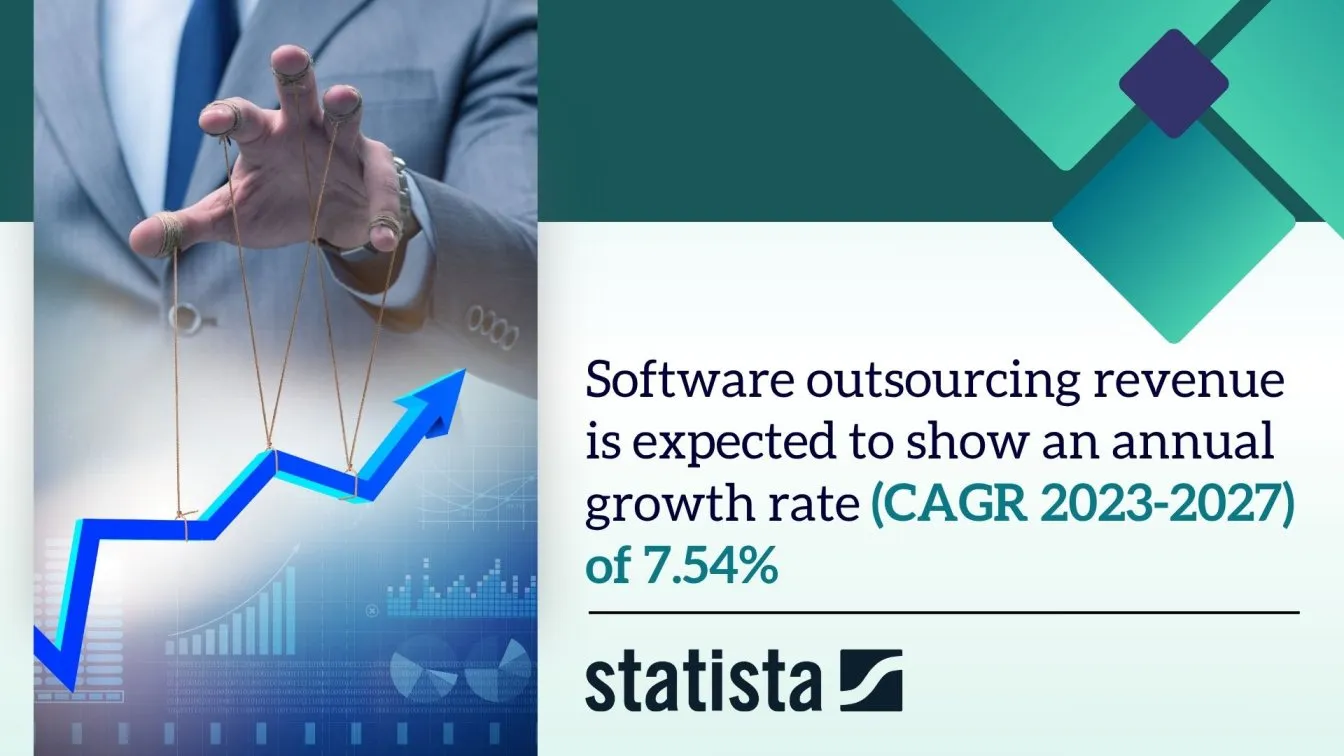
Key Reasons to Outsource Software Testing Today
Internal QA teams often struggle with resource constraints, lacking the necessary time, expertise, and testing infrastructure. This is where outsourcing software testing services becomes a strategic advantage. By tapping into external experts, companies gain immediate access to experienced QA engineers and QA testers, who are already equipped with the right tools and frameworks.
Cost-Efficient Access to Expert QA Engineers
Outsourcing provides businesses with cost-efficient access to top-tier QA engineers without the long-term financial burden of hiring full-time employees. This model is especially beneficial for small and mid-sized companies that require high-quality software testing but cannot afford to build and maintain large internal QA teams.
The outsourced talent pool is filled with seasoned qa testers who are well-versed in automated software testing, software regression testing, and the entire software testing life cycle.
Enhanced Test Coverage Through Specialized Testing Services
Third-party software testing services give development teams access to niche and specialized testing expertise that is difficult to build internally. These services include advanced methodologies like software regression testing, automated software testing, and software performance testing, each tailored to ensure quality across multiple layers of an application.
By relying on outsourcing software testing services, teams can achieve consistent software quality assurance without being limited by in-house bandwidth. These vendors usually have certified QA testers, experienced QA engineers, and access to the best quality assurance software to provide full lifecycle support.
Unlocking Specialized Testing Services Through Outsourcing
Outsourcing software testing unlocks access to highly specialized testing services that many in-house teams may not be equipped to handle. External vendors bring deep expertise across a range of testing domains, including software regression testing, automated software testing, and tools for performance testing such as Gatling performance testing. These services help organizations meet the rigorous demands of modern application performance and reliability.
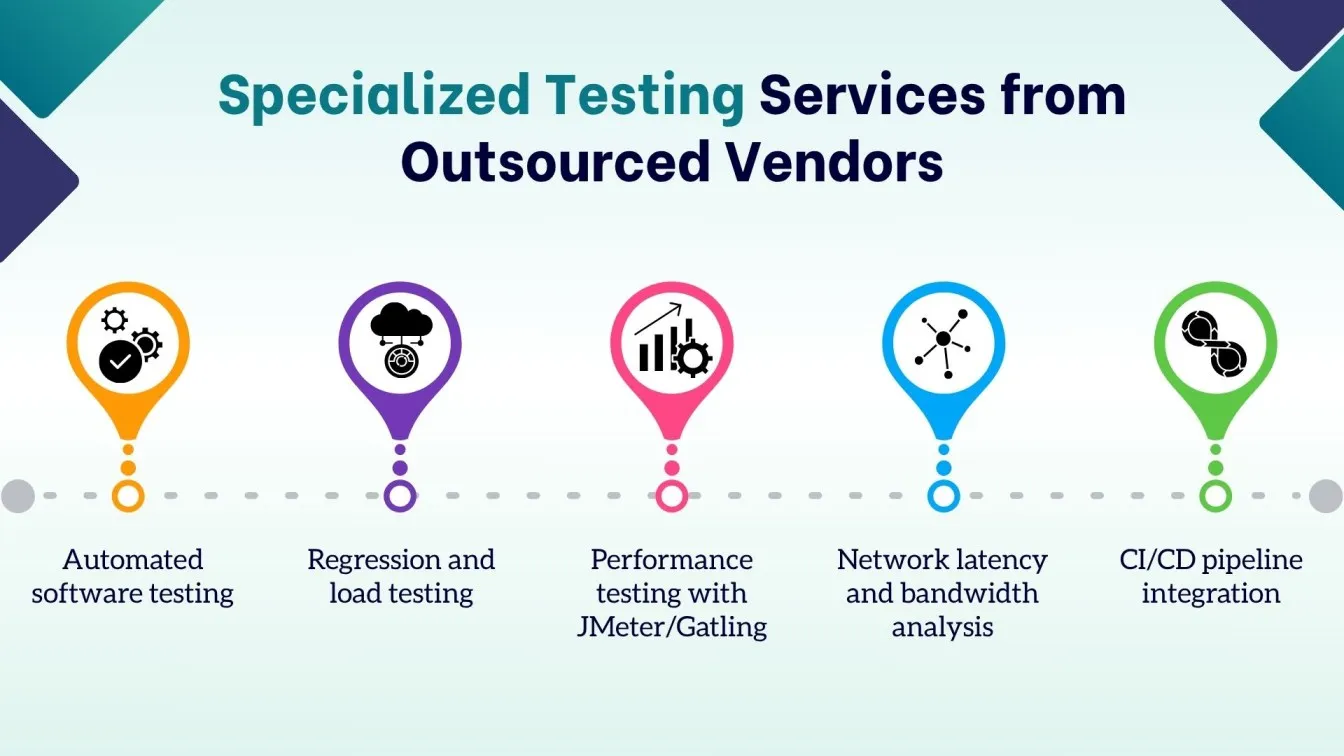
Software Regression Testing for Continuous Releases
In today’s fast-paced development pipelines, where continuous integration and continuous deployment (CI/CD) are the norm, software regression testing becomes critical. Each new code change has the potential to break existing functionality, making it essential to re-verify previously working features. Without proper regression testing, bugs may go unnoticed, leading to failures in production.
Outsourcing software testing services helps ensure that regression tests are executed thoroughly and regularly, even during time crunches. External vendors often bring specialized tools, frameworks, and expertise to streamline automated software testing, which plays a key role in efficient regression cycles.
Many software testing outsourcing companies offer regression testing as part of a broader qa automation services package. This reduces internal workload and ensures that regression tests are not deprioritized in the rush to release. It also ensures consistency and repeatability, two traits essential to maintaining software quality assurance across iterative product updates.
Tools for Performance Testing: From JMeter to Custom Frameworks
Modern applications must perform flawlessly under varying loads, and that's where tools for performance testing become essential. Specialized vendors offering outsourced software testing services utilize industry-standard tools like JMeter, Gatling performance testing, and tailored frameworks to simulate real-world traffic and identify system bottlenecks.
By outsourcing to experts proficient in both off-the-shelf and custom performance testing tools, businesses ensure their applications are rigorously evaluated under stress. These software testing services not only improve software quality assurance but also provide actionable performance benchmarks, aiding in release readiness and long-term scalability.
Automated Software Testing for Speed and Accuracy
Automated software testing has become a cornerstone of modern software development, helping teams accelerate delivery while maintaining precision. Unlike manual testing, automation enables rapid execution of repetitive test cases with minimal human intervention. Outsourced QA teams specialize in building robust test automation frameworks tailored to the application, reducing test cycle times significantly.
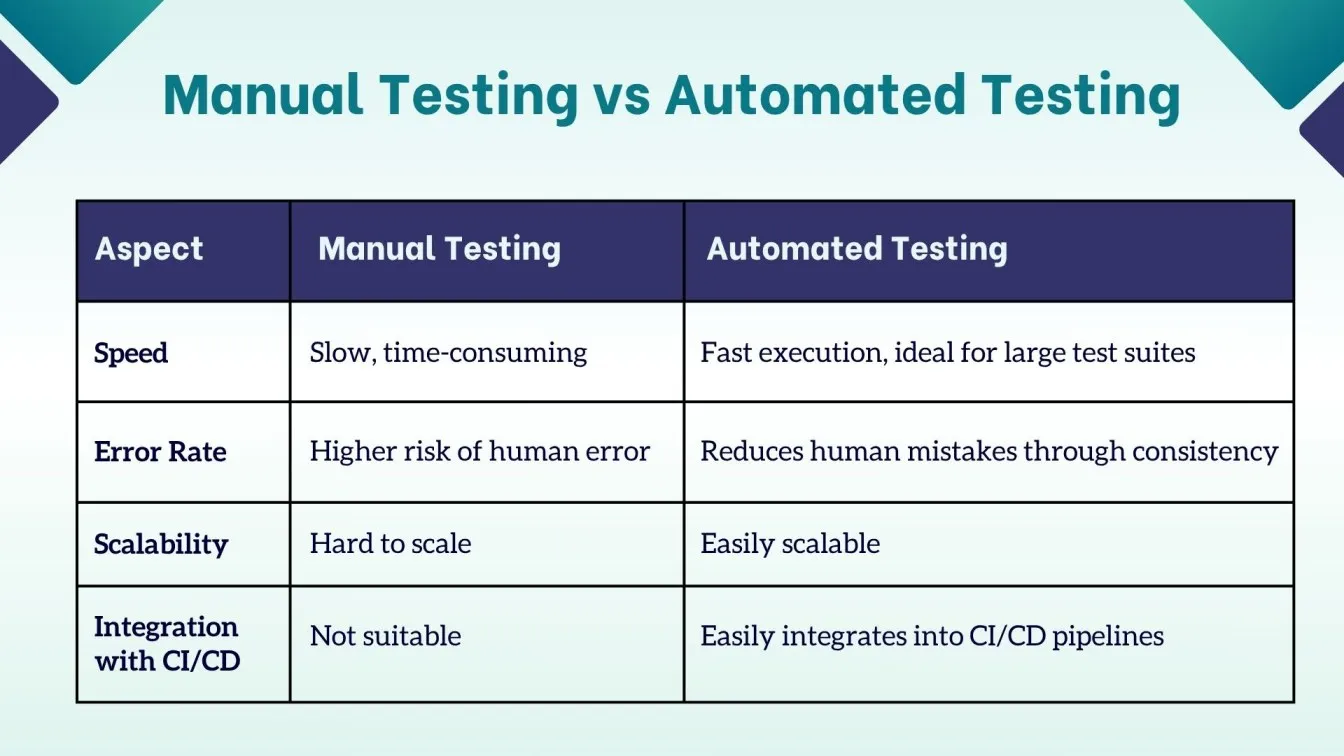
These outsourced teams often integrate automated software testing into CI/CD pipelines, allowing every new build to be tested instantly. This is especially valuable for regression testing, where automation ensures that existing features are validated without delays. Load testing service is another area where automation excels, enabling simulation of thousands of users and tracking system behavior under pressure, something manual testing simply can't scale for.
By leveraging AI-driven test automation services offered by experienced vendors, businesses can improve coverage, boost accuracy, and reduce the risk of overlooked defects. Automation also ensures consistency across releases and enables faster time-to-market, ultimately supporting stronger software quality assurance with fewer errors and more confidence in the final product.
How AI is Reshaping Outsourced QA Practices
AI is transforming how companies approach quality assurance by making software testing more intelligent, dynamic, and efficient. Through AI in software testing, outsourced vendors can now predict defect-prone areas, prioritize test cases, and even self-heal broken test scripts in real-time. This not only boosts accuracy but also significantly reduces manual effort.
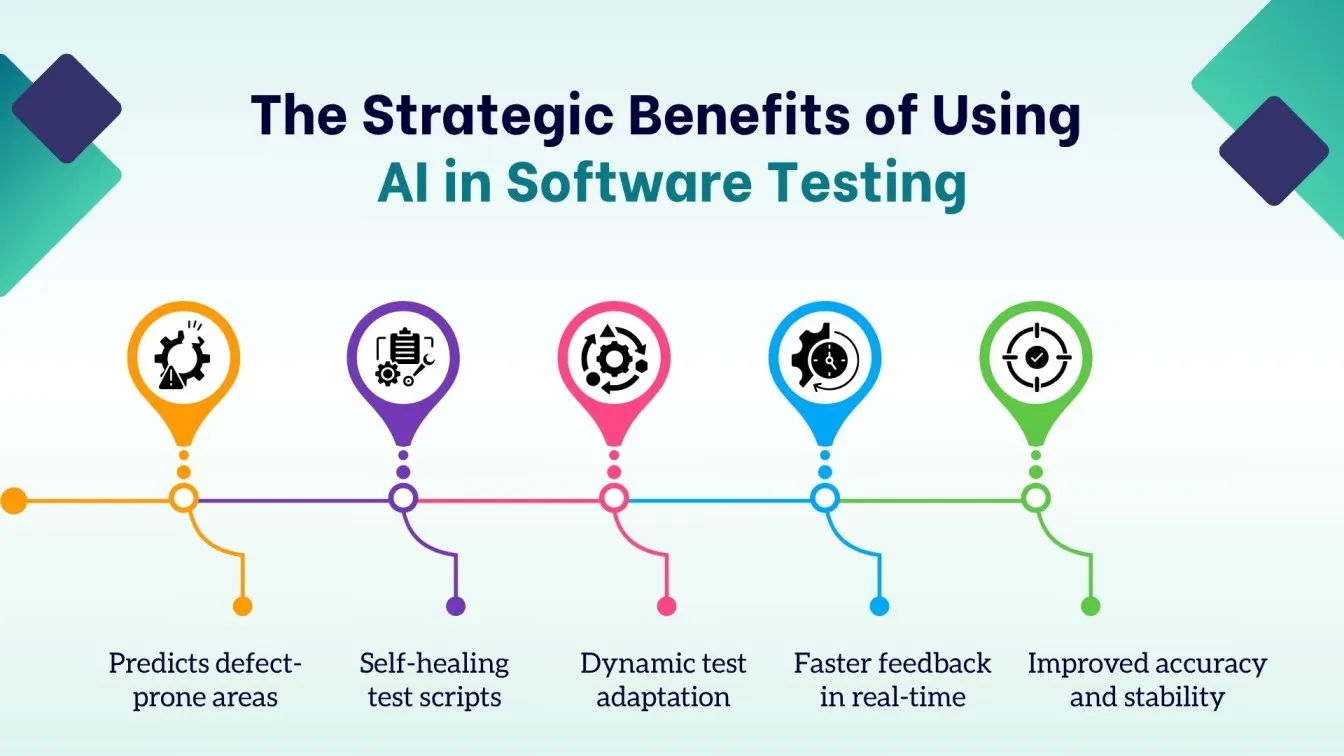
Leveraging AI in Software Testing for Smarter Automation
AI in software testing brings a transformative edge to test automation, making it not just faster but also more intelligent. By analyzing historical test data, AI can identify trends and perform predictive analysis to anticipate areas where bugs are most likely to appear. This enables QA teams to focus testing efforts more effectively and improve risk coverage.
AI also aids in anomaly detection, automatically spotting unusual patterns in system behavior that might be missed during manual reviews. This enhances the reliability of test automation services and improves overall software quality assurance. By leveraging AI, outsourced QA teams can deliver smarter, more adaptive, and faster testing solutions.
AI-Enabled Testing vs Conventional Automation
Traditional test automation relies heavily on static scripts that often break with minor UI changes or data structure updates. This results in frequent maintenance, slowing down testing efficiency, and increasing the workload for QA automation services. In contrast, AI-enabled testing brings adaptability and resilience by learning application behavior and automatically adjusting test flows as changes occur.
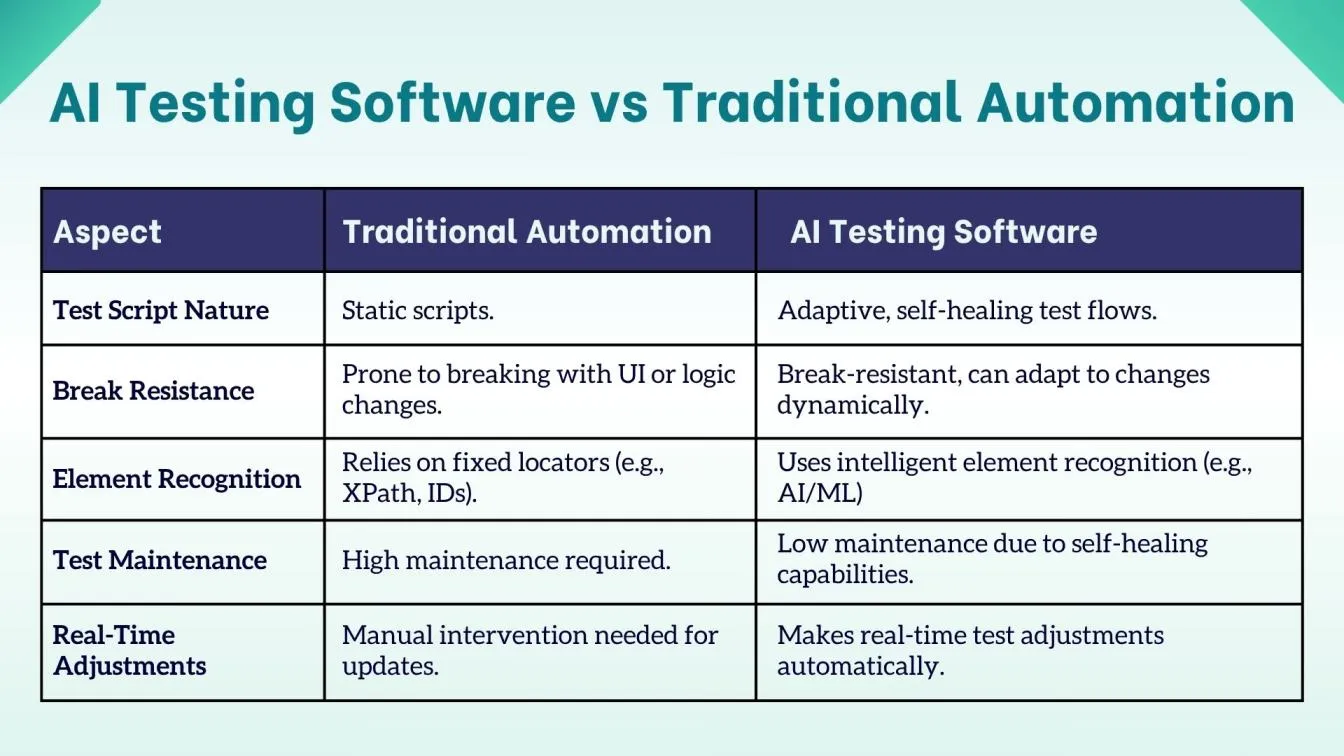
With AI in software testing, systems can intelligently locate UI elements, even if they move or change attributes, reducing false negatives and test failures. This adaptability makes AI-enabled testing ideal for agile and DevOps environments, where applications evolve rapidly. It enhances accuracy and stability across test runs, even in complex testing pipelines.
Real-Time Adaptability with AI Testing Software
AI testing software introduces real-time adaptability that traditional approaches lack. During execution, it can dynamically respond to UI changes, data variations, and even system behavior shifts, without manual intervention. This is especially valuable for software testing outsourcing services that need to deliver results quickly across multiple projects and environments.
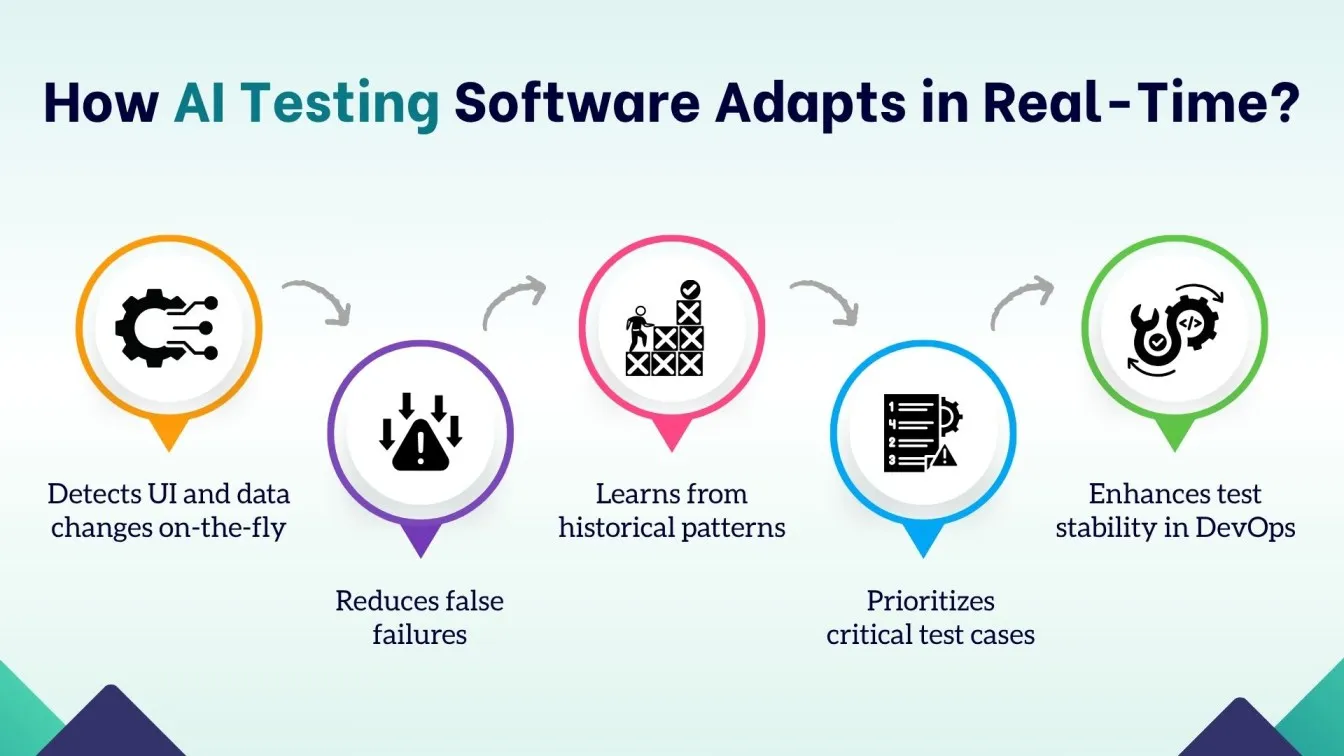
By staying in sync with the application under test, AI testing software ensures faster feedback loops, better test coverage, and more accurate reporting. This real-time responsiveness helps software testing outsourcing services meet tight deadlines, reduce turnaround times, and ultimately deliver higher quality software with fewer bugs.
Choosing the Right Partner: What to Look For in a Software Testing Outsourcing Company
Choosing the right software testing outsourcing company is essential for ensuring product quality, meeting deadlines, and achieving business goals. An ideal partner should combine deep technical expertise with industry-specific knowledge, offer a wide range of testing services, and use modern tools that align with your development processes.
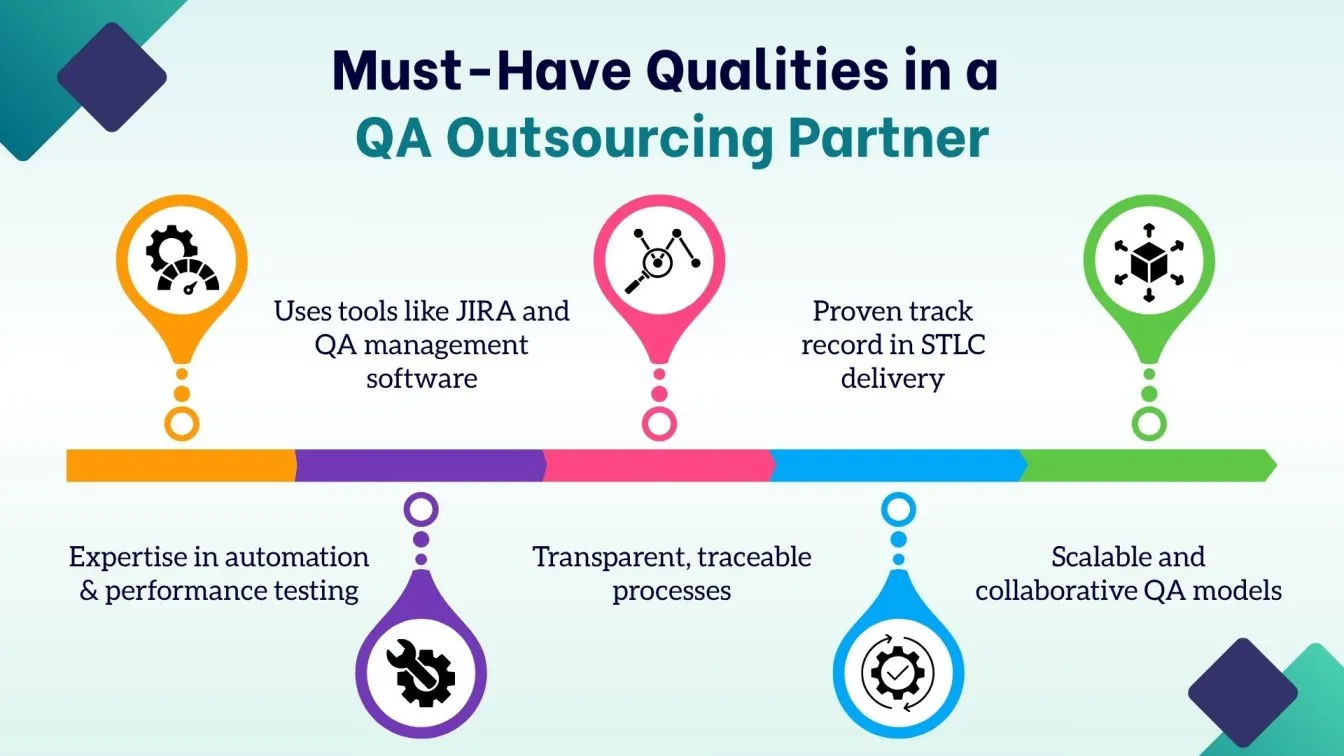
Expertise in QA Automation Services and Performance Testing
Expert QA automation services go beyond just running scripts; they involve strategic planning, test framework development, and intelligent orchestration of test cases for optimal efficiency. When businesses outsource QA, they expect partners to not only accelerate test execution but also maintain accuracy and adaptability under tight timelines.
A crucial aspect of automation expertise lies in software performance testing. Whether it’s stress testing, load testing, or endurance testing, experienced vendors know how to simulate real-world conditions to assess system behavior under pressure.
Additionally, network performance testing is key for applications with real-time interactions or distributed systems. It evaluates latency, bandwidth usage, and data packet loss, factors that directly affect user experience.
Use of Industry-Standard Tools Like JIRA Software Testing Tool
Leading QA vendors rely on proven tools like the JIRA software testing tool to manage the entire testing lifecycle efficiently. JIRA offers centralized test case management, making it easier to track requirements, link test cases to user stories, and monitor progress in real-time, all of which are essential for fast-paced development cycles.
In outsourced QA setups, where coordination is critical, using an industry-standard tool like JIRA ensures smoother workflows and consistency across distributed teams. It enables better project control, audit trails, and accountability, which are fundamental to delivering high-quality outcomes in modern software testing services.
Transparent Processes and Proven Software Quality Assurance
A key advantage of working with reliable outsourcing vendors is their strong focus on software quality assurance. These partners implement structured processes supported by quality assurance management software, which helps standardize testing workflows, maintain audit trails, and ensure every stage of the software testing life cycle is clearly documented and executed with precision.
Transparency plays a major role in building trust and ensuring accountability. By sharing test strategies, reports, and quality metrics openly, these vendors give businesses full visibility into how their products are being tested and improved. This openness helps identify bottlenecks early and fosters collaborative problem-solving between developers, software quality assurance testers, and stakeholders.

Additionally, proven QA vendors apply best practices across automated software testing, regression cycles, and performance checks, backed by their expertise in both tools and domain-specific methodologies. Their commitment to software quality assurance ensures consistent, reliable, and scalable delivery, aligning perfectly with long-term business goals.
Conclusion
Outsourcing software testing has evolved into a strategic necessity for modern development teams navigating complex, fast-paced release cycles. As applications grow in scope and intricacy, internal QA teams often struggle with limited resources, skill gaps, and outdated tools.
By leveraging software testing outsourcing services, businesses gain immediate access to specialized QA engineers, robust automation frameworks, and advanced quality assurance management software, all of which contribute to faster releases, enhanced test coverage, and stronger software quality assurance.

From cost-efficient access to expert QA testers to the integration of cutting-edge technologies like AI in software testing and Gatling performance testing, autonomous testing outsourcing empowers teams to elevate their testing capabilities far beyond what’s feasible in-house.
Ultimately, choosing the right software testing outsourcing partner enables organizations to maintain product quality without compromising development velocity.
By aligning with a vendor that offers proven QA automation services, performance testing expertise, and transparent workflows, companies can confidently deliver reliable, high-performing digital products. Outsourcing is not just about saving time or money; it’s about future-proofing your quality assurance strategy for continuous innovation and sustained growth.
People Also Ask
What is UAT testing in Workday?
UAT (User Acceptance Testing) in Workday ensures that the system meets business requirements before going live by involving real users in the validation process.
Why is software testing essential?
Software testing is vital for identifying bugs, ensuring functionality, improving performance, and maintaining user trust.
What are the types of product testing?
Common types include regression testing, functional testing, performance testing, usability testing, and automated software testing.
Is outsourcing a dying concept?
No, outsourcing software testing is evolving, especially with the rise of AI in software testing and the need for specialized QA expertise.
Is outsourcing good or bad for companies?
It’s beneficial when done right. QA testing outsourcing offers scalability, cost-efficiency, and access to skilled talent, making it a strategic advantage.




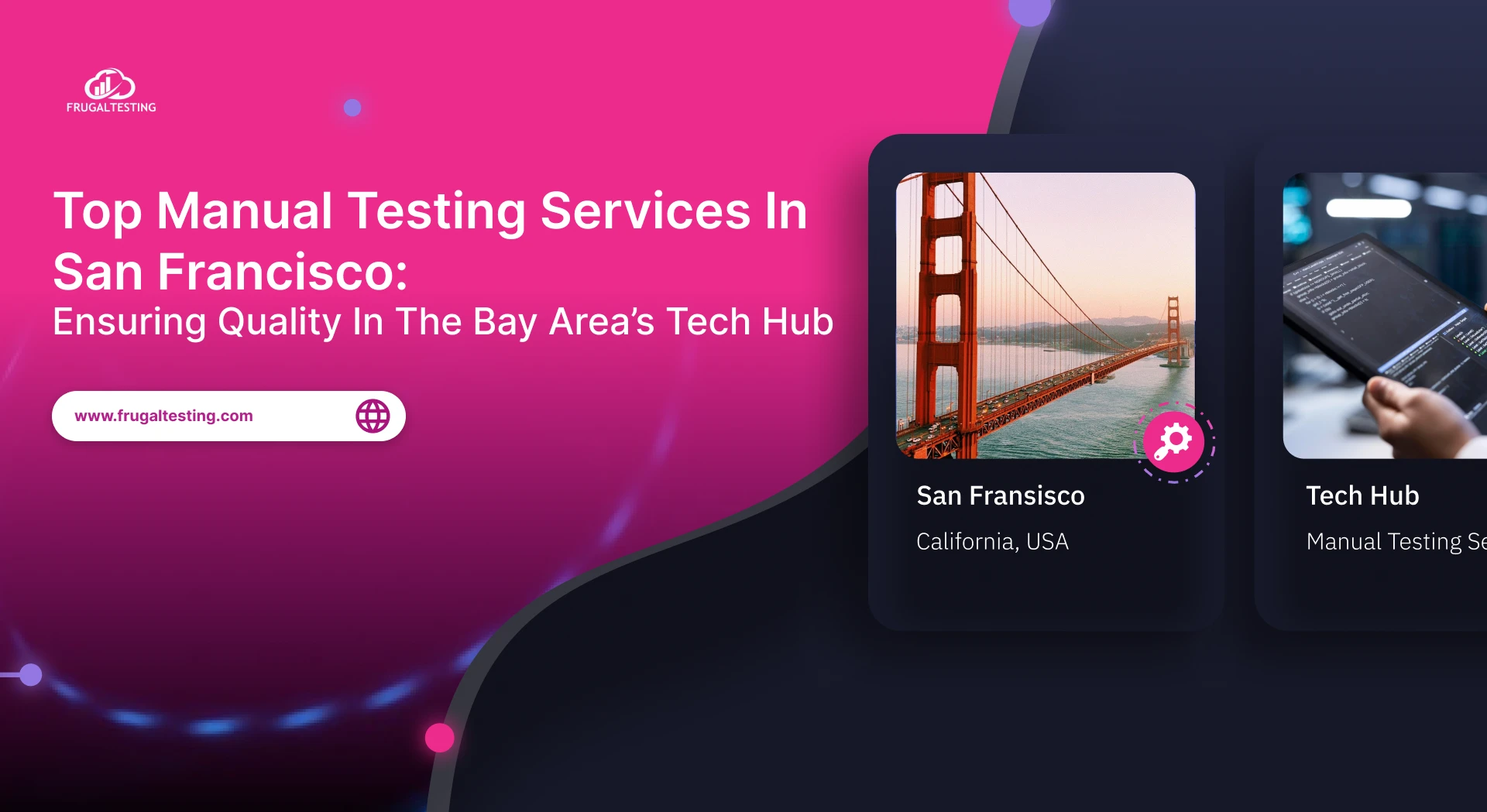
%201.webp)

